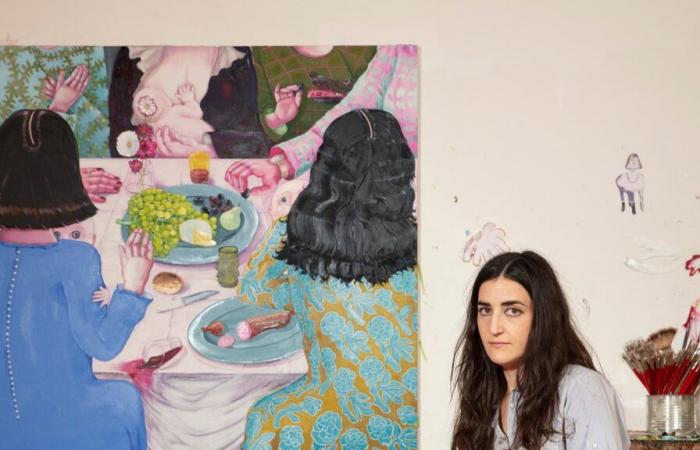In Massachusetts, in the heart of the deep countryside, hides a workshop very close to a garden – that of Nikki Maloof. In this space a thousand miles away from exhausting urbanity, the artist paints canvases in shimmering colors and recurring themes. Despite an undisguised joviality, his work reflects a certain melancholy. Addressing subjects like motherhood, she explores the joys and rough edges of the domestic sphere. At the end of 2024, Nikki Maloof crosses the Atlantic Ocean to exhibit some of his recent paintings through his exhibition Around The Clockinstalled in the Perrotin gallery in the heart of the Marais.
Nikki Maloof or colorful discomfort
The art of Nikki Maloof catches the eye. The colors are captivating and human features are mischievously distorted. From this observation, we must return to the roots of the American artist. Fascinated by the domestic space, she represents through each painting, a room: the kitchen, the living room, the bedroom, the garden… Life scenes with recurring elements, the paintings of Nikki Maloof exploit the complexity of humans. By playing between the exterior and the interior, she juggles with the moments of life, sometimes displaying a moment of complicity between a mother and her child, sometimes a dinner, sometimes a loving embrace.
Nikki Maloof is mainly inspired by the Flemish and Italian Renaissance, visible in the omnipresence of plants and flowers but also in the staging of the subjects. While using vibrant nuances, she offers a vision of the world around us that is both mischievous and dark. The painter offers a reflection on the private as a political object, a central pivot of feminist studies. His still lifes, tomato plants devoured by glasses, invite us to rethink our existence and especially the brevity of our time on earth.
The women are depicted with delicacy, flowered dresses at the Almodovarred varnish and pearl necklaces. Like many of her ancestors, authors, poets, directors, Nikki Maloof makes interior space the setting for a construction of identity, a personal expression, tinged with melancholy. Without any hierarchy between the models, it establishes a perceptible equality where domesticity finds itself undermined.






